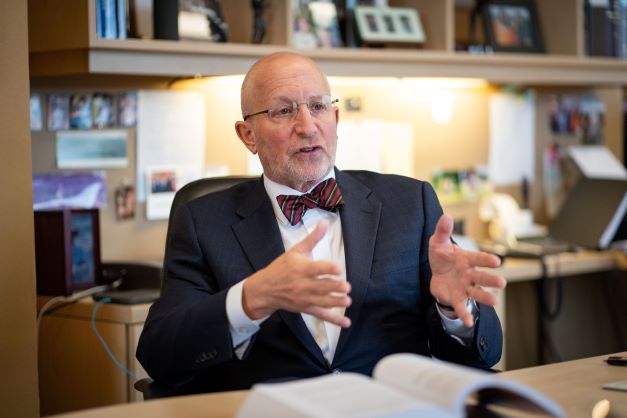
Before testimony concluded in the hush money trial of former president Donald Trump and Stormy Daniels in New York, Randall Levine, managing partner at Levine & Levine, spoke with Michael Patrick Shiels of the Michigan's Big Show regarding the landmark case.
Here’s the Q&A between Shiels and Levine about the case:
Shiels: Has a crime been established?
Levine: That remains to be seen. Trump is presumed to be innocent just like any other defendant. Our government has to weigh proof of guilty beyond a reasonable doubt and the defense is a two-tiered defense, not only do they have to prove that the records are fraudulent and that doesn’t seem to be too much of a hurdle. But then they have to prove in order to elevate a misdemeanor to a felony that the falsification was to cover another offense – and that’s where it’s going to get, in my view, more difficult for the government.
Shiels: Is there another offense?
Levine: Well, the government has a number of theories and, as I understand it, the coverage that I’ve read, the lawyers are debating right now how those theories will be expressed to the jury and the jury will hear instructions, and a lot will depend on how they’re instructed so they can choose amongst several different potential other offenses that were covered up, which at the last coverage I heard, that’s how Judge (Juan) Merchan was leaning.
Shiels: Do you think that the jury of his so-called peers thinks that Donald Trump in New York is actually capable and has the expertise of sorting through this kind of minutia in the jury room?
Levine: I’ve been trying cases for 40 years, defending criminal cases, and, I have to say that I have a lot of faith in the jury system. The jury system works and they usually get it right. The short answer is, yes.
Shiels: We’re speaking before the benefit of hearing the closing arguments, but is it like 12 Angry Men and the 12th person in that jury room says, “Nah, I don’t think there’s much to see here.” Is the party over for the prosecution?
Levine: Well, the party’s not over. A jury must render a unanimous verdict in a criminal case. And if one party doesn’t agree with that other party and can’t sway the entire jury unanimity, they come back and say they all don’t agree, and then you get yourself in a situation where you have a hold on a juror or two – and that will hang a jury and that will cause a mistrial, which will allow the government, in most situations to retry a defendant if they choose.
Shiels: In order for there to be a not guilty verdict, it has to be a ponderance of jurors who say not guilty in that room?
Levine: No- it has to be all of the jurors. We’re talking about a unanimous verdict where they agree that the government has not proven the case beyond a reasonable doubt.
Shiels: And in order for guilty it has to be unanimous?
Levine: That’s correct. That’s our system of justice.
Shiels: Do you think the jury will hold it against Donald Trump for not testifying?
Levine: You know, that’s a great question. I would hope not. And in my experience, once again, jurors understand that the burden of proof is exclusively on the government. A defendant accused is presumed to be innocent, and has no obligation to testify and offer any evidence. The jury is instructed by the court in every case where a defendant chooses not to testify, that they are to draw no adverse influences in their election not to testify.
Shiels: Do you think that if Stormy Daniels and Michael Cohen ultimately prove to be unlikeable that they will also be not credible in the eyes of a jury?
Levine: That’s a tough question. What the government did in this case was try to corroborate two witnesses whose credibility is questionable with other independent evidence, which is generally what the government does. A lot of times in criminal cases the government’s witnesses are difficult. It doesn’t mean that they’re not telling the truth and sometimes they tell the truth about some things and lie about other things. That’s why the government uses corroborating evidence on key facts to try to persuade a jury that even though the witness may have lied about something they’re honest about other things and that all goes into the mix as to whether or not they’ve proven the case beyond a reasonable doubt.
Shiels: If you found out the former president is found guilty, what is the range of penalty that could actually come from it? Could it be just a slap on the wrist or probation?
Levine: I’m not that familiar with New York law, but as I understand it, if the former president is convicted of a felony offense, he faces the realistic possibility of being incarcerated as part of the sentence. Sentencing must be proportional as to the defendant’s similarly accused in this type of offense, and so the court would be obligated despite the fact that the man if a former president of the United States. If he is convicted of a felony offense to sentence him proportionally as he would others similarly situated defendants and that could result in a sentence of incarceration.
Listen to the full interview, here.

